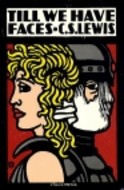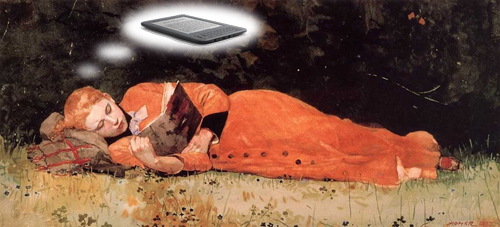Till We Have Faces
 Till We Have Faces is C.S. Lewis’ retelling of the myth of Cupid and Psyche. As he explains in a note at the end, he alters the tale somewhat. The resulting story explores the themes of faith, jealousy, love, and the deceptiveness of words.
Till We Have Faces is C.S. Lewis’ retelling of the myth of Cupid and Psyche. As he explains in a note at the end, he alters the tale somewhat. The resulting story explores the themes of faith, jealousy, love, and the deceptiveness of words.
This is the third time I’ve read this novel, and I think I’m ready to give up on liking it. It is often praised as one of Lewis’ best, but even though it engages my mind, I can’t seem to enjoy it. Probably I am missing something. After all, that’s one of the themes of the novel — what we think we know vs. what we really know.
At one level, the story is about a conversion. Orual, queen of the fictional (and, unlike the Christian landscapes of Lewis’ other works, ostensibly pagan) land of Glome, is laying out her complaint against the gods — a complaint which, she thinks, centers on the “selfless” love she has poured out on her sister Psyche, and the pain and tragedy that result. It’s apparent pretty early on that Orual is at least partly deceived about her own motives, which are not so selfless after all. Jealousy, and above all possessiveness, characterize her treatment of all the characters in the story that she claims to love: Psyche, Bardia, and the Fox (her Greek tutor and a representative of rationalism). Even Orual has an inkling about the true character of her love. But it takes most of the story before she is able to acknowledge it and come to a kind of reconciliation with the gods.
At another level, part of what Lewis seems to be about in this tale is a critique of the feminine principle — the feminine as an orientation in the world, not just as a gender — of which Orual’s devouring love is one example. Ungit, the deity of Glome, is female — a version of the Greek goddess Aphrodite — and is insatiable in her thirst for sacrifice. She consumes everyone and everything, gorging herself on blood. When Orual studies the stone said to be Ungit in the temple, she describes it this way:
I have said she had no face; but that meant she had a thousand faces. For she was very uneven, lumpy and furrowed, so that, as when we gaze into a fire, you could always see some face or other. She was now more rugged than ever because of all the blood they had poured over her in the night. In the little clots and chains of it I made out a face; a fancy at the moment, but then, once you had seen it, not to be evaded. A face such as you might see in a loaf, swollen, brooding, infinitely female.
It’s the “infinitely female,” unchecked, that operates as a force of destruction in this novel. Orual as older sister, and Orual as queen, and Ungit as goddess, all become wrapped in one by the end, when Orual’s key insight is in recognizing that her style of love is really not love at all, but simply consumes the lives of those around her. There is no complementary masculine force to balance or check her.
There are aspects of the novel that I don’t understand. At the end, Orual has a series of mystical visions that help her to see how her fate and Psyche’s remain connected even after Orual’s treachery — only partly recognized as such — condemns Psyche to slavery to Ungit. That part was symbolic and I wasn’t sure of its meaning, except that it showed even a controlling love like Orual’s can be incorporated into a redemptive purpose.
I’m sure none of this is making any sense at all to anyone who hasn’t read the book. (If you’ve read it and have some thoughts to share, feel free!) However one theme I liked, and may even be able to discuss coherently, is the deceptiveness of words. The title, which resonates with the idea in I Corinthians 13 that “now we see through a glass darkly, then we shall see face to face,” comes from a passage near the end where Orual (in a vision — more on that in a minute) makes her complaint to the gods. She has been writing a book about it, but when she finally has a chance to express it she realizes the truth is different from what she thought:
When the time comes to you at which you will be forced at last to utter the speech that has lain at the center of your soul for years, which you have, idiot-like, been saying over and over, you’ll not talk about joy of words. I saw well why the gods do not speak to us openly, nor let us answer. Till that word can be dug out of us, why should they hear the babble that we think we mean? How can they meet us face to face till we have faces?
I see two strands in this speech. One is that it takes a long time to gain a truthful glimpse of yourself. Another is that words, while they have a power to capture meaning, also can make it more elusive. What Orual is saying, and the reality she wants to express, are two different things. Lewis himself was by all accounts an excellent arguer, but at times he reflected that faith is less a matter of words than of deep inner orientation and action. “Having faces” in this novel means you see yourself as you really are, in a way that transcends your self-deceptions and your edifices of words.
I’m afraid this isn’t a very good book review at all. But if it says anything about Till We Have Faces, it’s that this story invites you to ponder and gives you lots to consider. Even though it’s not my favorite, it gives me lots to think about.


